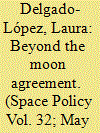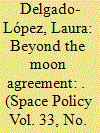|
|
|
Sort Order |
|
|
|
Items / Page
|
|
|
|
|
|
|
| Srl | Item |
| 1 |
ID:
142553


|
|
|
|
|
| Summary/Abstract |
The 1979 Moon Agreement was conceived as a way to help manage one of the expected outcomes of expanded activities on the Moon: exploitation of its natural resources. However, the fifth of the international space treaties elaborated in the early stages of the Space Age failed to receive widespread acceptance. Persisting polarization about key provisions in the Agreement hampers its success in the near future. This article examines the legacy of the Moon Agreement from a policy perspective by identifying key principles that are poised to resurface in the near future with the advent of new actors in space, especially the private sector. It argues that the development of norms of behavior together with national regulation and legislation represent the most promising way to engage established and emerging space actors in ensuring responsible behavior beyond Earth orbit.
|
|
|
|
|
|
|
|
|
|
|
|
|
|
|
|
| 2 |
ID:
142576


|
|
|
|
|
| Summary/Abstract |
The 1979 Moon Agreement was conceived as a way to help manage one of the expected outcomes of expanded activities on the Moon: exploitation of its natural resources. However, the fifth of the international space treaties elaborated in the early stages of the Space Age failed to receive widespread acceptance. Persisting polarization about key provisions in the Agreement hampers its success in the near future. This article examines the legacy of the Moon Agreement from a policy perspective by identifying key principles that are poised to resurface in the near future with the advent of new actors in space, especially the private sector. It argues that the development of norms of behavior together with national regulation and legislation represent the most promising way to engage established and emerging space actors in ensuring responsible behavior beyond Earth orbit.
|
|
|
|
|
|
|
|
|
|
|
|
|
|
|
|
| 3 |
ID:
120098


|
|
|
|
|
| Publication |
2012.
|
| Summary/Abstract |
Space sustainability is emerging as a core element of national policy and international initiatives. At this time, however, a coherent strategy and supporting policies have not been developed. To initiate a conversation to develop such a strategy, the authors have applied the principles developed by Elinor Ostrom for terrestrial common-pool resource (CPR) governance to near-Earth orbit in space. A concern arises as to whether Ostrom's eight principles are a good "fit" for application to space CPR because of the unique physical characteristics of space and the legal underpinnings of our presence there. This commentary will address selected issues raised by Weeden and Chow, and suggest alternative ways to approach near-Earth orbit sustainability.
|
|
|
|
|
|
|
|
|
|
|
|
|
|
|
|
| 4 |
ID:
132721


|
|
|
|
|
| Publication |
2014.
|
| Summary/Abstract |
space systems play an important role in sustaining the development, prosperity and security of many nations. As more nations become critically reliant on space systems, questions of maintaining safety and strategic stability in outer space have come to the fore. Transparency and Confidence-Building Measures (TCBMs) for outer space activities have an important role to play in providing clarity about the intentions of States and in articulating norms of behaviour in outer space. TCBMs take several forms. They may be the elaboration of basic principles related to the exploration and use of outer space, political measures related to establishing norms of conduct, information-sharing activities to improve the transparency of outer space activities, operational practices which demonstrate a commitment to mutual cooperation in outer space, or consultative mechanisms. We present an analytical framework for evaluating potential TCBMs and illustrate the application of this framework to examples of potential operational, regulatory, treaty-based and declaratory TCBMs.
|
|
|
|
|
|
|
|
|
|
|
|
|
|
|
|
| 5 |
ID:
142581


|
|
|
|
|
| Summary/Abstract |
Given the renewed interest in exploring and exploiting the resources of the Moon, this paper will explore the proposition that sustainability should be a fundamental consideration when formulating policy in respect of regulating lunar activities. The current lunar regulatory framework, however, is a product of the Cold War and conceived at a time when sustainability and space environmental issues were not within the contemplation of policy makers. Yet there is an increasing awareness of the need for space sustainability within the space community and this should be focused towards shaping policy in respect of lunar exploration. Inherently linked to this is a new multi-sectored era of space activity with emerging space nations and private companies competing alongside established space actors to exploit the natural resources of the Moon. Disputes over legally binding methods of lunar resource allocation are harming the chances of obtaining any consensus regarding sustainable development. This discussion will show that there is no compelling evidence that commercial mining of the Moon will yield the vast natural resources that would make such a venture economically viable. It will be advocated that a policy of promoting the use of the moon for scientific and exploratory purposes by means of existing fora such as IDAC and using non-binding codes to create normative values of sustainability should be placed at the heart of lunar exploration policy.
|
|
|
|
|
|
|
|
|
|
|
|
|
|
|
|
| 6 |
ID:
145034


|
|
|
|
|
| Summary/Abstract |
The concept of sustainable development states that every nation is free to determine how to meet its own needs and accrue its own benefits as long as it does not prejudice the ability of future generations to do the same. This end is challenging in the space domain as the existing emphasis on national concerns obscures the larger issues of international structural inequalities—lack of access, barriers to capacity building and technology absorption—while simultaneously magnifying issues related to market protectionism, which are then disguised as security issues. This article makes the claim that it is possible to correct this distortion while safeguarding the focus on global issues, such as space sustainability. While the concept of space sustainability is understood differently depending on the forum for discussion, it is clear that the dominant understanding coincides with the logic for space cooperation as “Governance for Global Security,” and this focuses more on the needs of the present space actors. Analytical tools designed with the “Cosmopolitan Approaches to International Law” express forms of cooperation that produce reciprocal obligations to enable all participants, both present and aspirant, in space exploration and
|
|
|
|
|
|
|
|
|
|
|
|
|
|
|
|
| 7 |
ID:
157174


|
|
|
|
|
| Summary/Abstract |
A key component of efforts to address complex threats to space sustainability – such as congestion of key orbits, space debris, radio frequency interference, and potential for conflict in space – is to engage new space actors in the process. This paper will gauge the degree of awareness, interest, and involvement in space sustainability advancement of three emerging space nations in Latin America. Building on prior research that examined the development paths of space actors in three emerging space regions of the world and their impact on space sustainability, this paper will offer insights on the current space sustainability concerns and priorities of Brazil, Colombia, and Mexico. Through literature review, personal communication with experts, and by examining the involvement of these actors in international space forums, this paper identifies common themes about how these actors approach the concept of sustainability, their primary concerns, and involvement in and perspectives on mechanisms to promote it. The findings and conclusions derived from this analysis will help inform ongoing efforts to engage other emerging space actors in the region in the advancement of space sustainability.
|
|
|
|
|
|
|
|
|
|
|
|
|
|
|
|
|
|
|
|
|